This site is supported by our readers. We may earn a commission, at no cost to you, if you purchase through links.
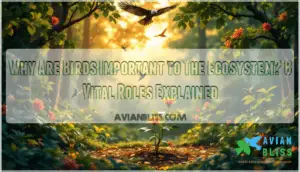
Birds don’t just add beauty to your morning—they’re working around the clock as pest controllers, seed dispersers, pollinators, and cleanup crews that keep entire ecosystems functioning.
From vultures preventing disease outbreaks to hummingbirds facilitating plant reproduction, these feathered allies maintain balances that agriculture, forests, and human health depend on.
Understanding their roles reveals why protecting bird populations isn’t just about conservation—it’s about preserving the systems that sustain life itself.
Table Of Contents
- Key Takeaways
- Birds as Ecosystem Architects
- Birds as Nature’s Clean-Up Crew
- Birds as Pest Control Powerhouses
- Birds as Seed Dispersal Champions
- Birds as Pollination Partners
- Birds as Fungi Spreaders and Tree Allies
- Birds as Indicators of Ecosystem Health
- Birds as Ecological Engineers
- Frequently Asked Questions (FAQs)
- Why are birds important to our environment?
- How do birds help the ecosystem?
- How do birds contribute to biodiversity?
- How do birds help forests grow?
- How do birds affect our ecosystem?
- Why are birds important to plants?
- How do birds help ecosystems and humans?
- What would happen if there were no birds?
- What if there were too many birds in this ecosystem?
- How do birds help plants?
- Conclusion
Key Takeaways
- Birds maintain critical ecosystem functions through pest control (consuming 400-500 million tons of insects annually), seed dispersal (supporting 70% of forest plant diversity in some regions), and pollination that directly impacts food security and agricultural productivity worth billions globally.
- Vultures and other scavenging birds prevent disease outbreaks by rapidly removing carcasses and neutralizing deadly pathogens like anthrax, botulism, and rabies—with vulture population declines in India linked to nearly 50,000 additional human rabies deaths.
- Birds function as ecosystem architects and keystone species by creating habitats for other wildlife, spreading fungal spores essential for tree health, transporting marine nutrients to coastal areas, and maintaining food web balance through top-down and bottom-up ecological effects.
- Declining bird populations serve as early warning indicators of broader ecosystem degradation, with North American bird populations down 29% and research showing that losing birds triggers cascading failures in seed dispersal (84% reduction), plant regeneration (55% decline), and pest control systems.
Birds as Ecosystem Architects
Birds don’t just live in ecosystems—they actively shape them. From spreading seeds across landscapes to keeping pest populations in check, these winged architects create the conditions that allow entire habitats to thrive.
Here’s how they build and maintain the natural world around us.
Seed Dispersal and Nut Spreading
Think of birds as nature’s gardeners—constantly planting tomorrow’s forests with every meal they eat today. Through seed dispersal and nut spreading, they transform entire landscapes, carrying seeds miles from parent trees. Here’s how birds support forest regeneration and biodiversity conservation:
- Jays bury acorns in scattered locations, creating new oak groves
- Fruit-eating birds deposit seeds in nutrient-rich droppings across diverse habitats
- Migratory species introduce plants to isolated islands and continents
- Nutcrackers cache thousands of pine seeds, fueling conifer expansion
- Island birds maintain 70% of forest plant diversity through constant seed transport
This ecological importance maintains ecosystem balance you can witness in recovering woodlands everywhere.
Insect and Rodent Population Control
While birds scatter seeds across the landscape, they simultaneously act as your ecosystem’s frontline defenders against agricultural pests and disease-carrying rodents. Through biological regulation, birds control pests by consuming 400-500 million tons of insects annually, delivering natural pest management without chemicals. Owls and hawks maintain rodent control, while swallows tackle flying insect pests. This ecological balance protects crops and prevents disease outbreaks, making birds indicators of environmental health.
| Bird Species | Primary Pest Target | Annual Impact |
|---|---|---|
| Barn Owls | Mice, rats, voles | 1,000+ rodents per pair |
| Barn Swallows | Flying insects, mosquitoes | Thousands daily per bird |
| Bluebirds | Grasshoppers, beetles, caterpillars | Reduces crop damage 30%+ |
| Purple Martins | Mosquitoes, flying ants | 2,000 insects daily |
Your farms and gardens benefit directly from this ecosystem health service—pest control worth billions annually.
Scavenging and Disease Prevention
You’ve seen how birds defend crops from insect armies and rodent invasions, but their cleanup work addresses an even more dangerous threat—the spread of deadly pathogens from rotting carcasses. Vultures excel at this scavenger role, removing dead animals before bacteria multiply. Their stomach acid neutralizes anthrax, botulism, and rabies, fundamentally providing waste management that protects your community.
Birds are nature’s cleanup crew, and as indicators of environmental health, their declining numbers signal problems. Without effective carcass removal, disease spread accelerates while pest control suffers.
Five ways scavenging birds safeguard ecosystem health:
- Rapid carcass removal – Vultures consume an entire deer in hours, stopping pathogen multiplication
- Disease neutralization – Their digestive systems destroy harmful bacteria that sicken mammals
- Competition reduction – Efficient cleanup limits disease-carrying scavengers like rats and feral dogs
- Water protection – Quick disposal prevents carcass toxins from contaminating streams and groundwater
- Public health defense – Studies show vulture declines correlate with increased rabies and anthrax outbreaks
Maintaining a Healthy Food Chain
When you remove even one bird species from the mix, the entire food chain feels the ripple—from the insects they eat to the predators that depend on them. Birds maintain ecosystem balance through food web dynamics and species interactions that drive nutrient cycling across landscapes. Their ecological importance extends beyond what you’d expect—they’re living indicators of environmental health, revealing how well biodiversity conservation efforts are working.
Here’s how birds keep the food chain humming:
- Top-down control – Raptors regulate rodent numbers, preventing vegetation overgrazing and maintaining plant diversity
- Bottom-up effects – Seed dispersal and pollination by birds fuel plant growth that feeds countless herbivores
- Nutrient transfer – Birds spread seeds and move nutrients between ecosystems, connecting forests to wetlands
- Population checks – Insect-eating birds prevent pest explosions that would destabilize agricultural and wild food webs
- Predator support – Birds provide essential prey for foxes, snakes, and larger raptors, sustaining carnivore populations
Birds as Nature’s Clean-Up Crew
When nature’s creatures pass away, someone needs to manage the cleanup—and birds step up to do the dirty work. Scavengers like vultures play a vital role you mightn’t think about until they’re gone.
Let’s look at how these feathered sanitation workers protect both ecosystems and human health.
Vulture Population Declines and Disease Spread
Vulture populations have plummeted by more than 95% in some regions, and the ripple effects on human health have been nothing short of alarming. When vultures vanish, feral dogs and rats move in—scavengers that carry rabies and other zoonotic diseases. Studies in India linked vulture declines to nearly 50,000 additional human deaths from rabies transmission. The ecological consequences of bird decline become starkly visible when disease transmission accelerates. Without nature’s cleanup crew, mortality rates climb.
When vultures vanish, disease-carrying scavengers move in—India’s vulture collapse triggered 50,000 human rabies deaths, proving these birds are irreplaceable guardians of public health
| Region | Vulture Decline | Disease Impact |
|---|---|---|
| South Asia | 95-99% | 50,000+ rabies deaths |
| Africa | 60-90% | Anthrax outbreaks |
| Europe | 40-70% | Livestock disease spread |
Conservation work focused on vulture conservation isn’t just about protecting scavenger role functions—it’s about safeguarding ecosystem health and your community’s wellbeing.
Efficient Carcass Removal and Disease Prevention
A single vulture can strip a carcass clean in hours—a feat that prevents deadly pathogens from festering in the environment for weeks. Vultures are nature’s cleanup crew, performing ecosystem sanitization that protects you from anthrax, botulism, and tuberculosis. Their scavenger role outpaces other cleanup options through specialized gastric acids that neutralize bacteria most animals can’t manage.
Effective carcass disposal means:
- Rapid mortality management reducing pathogen exposure
- Disease prevention through acidic digestion killing harmful microbes
- Pest control by outcompeting disease-carrying scavengers
- Conservation work protecting birds as indicators of environmental health
Economic Value of Vulture Waste Disposal Services
Beyond disease prevention, vultures deliver massive economic benefits through their scavenging services. In Southern Africa alone, their waste management work is valued at over $251 million annually—that’s ecosystem savings you can measure. When India’s vulture population collapsed, the economy lost roughly $350 billion due to increased sanitation costs and disease spread. Birds are nature’s cleanup crew, and conservation efforts for birds protect these essential ecosystem services.
Here’s what vulture conservation means for waste management:
| Economic Metric | Value |
|---|---|
| Annual services (Southern Africa) | $251 million |
| Regional annual value | $1.8 billion |
| Sanitation services alone | $93 million/year |
| Conservation welfare gains | $30 million/year |
| Household time saved | 2.3 hours/year |
Just 600 vultures match a medium-sized rendering plant’s daily capacity, eliminating costly infrastructure while birds transform entire landscapes through natural processes.
The importance of bird conservation extends beyond ecosystems—it’s sound economic policy that protects communities and reduces government spending on alternatives that can’t compete with nature’s efficiency. Understanding the ecosystem services provided by vultures is essential for effective conservation strategies.
Impact of Vulture Declines on Public Health
Public health risks skyrocket when vulture populations collapse. India’s vulture decline from the late 1990s triggered over 104,000 additional human deaths annually between 2000 and 2005—that’s disease transmission on a catastrophic scale. Without these scavengers, stray dog populations surged, causing 39 million extra dog bites and 48,000 rabies deaths. Fecal bacteria in water supplies doubled, spreading anthrax and other infections.
Birds are nature’s cleanup crew, and the importance of bird conservation becomes crystal clear when you lose them. The social costs of keystone species collapse, such as ecosystem services, are a critical concern for environmental policy.
Birds as Pest Control Powerhouses
If you’ve ever watched birds darting through your garden or fields, you’ve witnessed one of nature’s most effective pest control systems at work. Birds consume staggering amounts of insects each year, providing benefits that directly protect your crops and reduce the need for chemical interventions.
Let’s look at how different bird species serve as your natural allies in managing pest populations.
Insect Consumption and Agricultural Benefits
Think of insectivorous birds as your farm’s unpaid workforce—they consume between 400 and 500 million metric tons of insects annually worldwide. This natural pest control delivers real agricultural benefits you can measure:
- Crop yield jumps dramatically: Dutch apple orchards saw up to 66% higher yields when birds managed insect populations.
- Pest management becomes sustainable: Birds reduce cabbageworm and diamondback moth populations by roughly one-third in brassica crops.
- Farm income increases: Jamaican coffee growers earned an extra $310 per hectare yearly from bird-driven pest control.
- Ecosystems stay balanced: Supporting bird biodiversity strengthens conservation while boosting your bottom line.
Biological Control of Insect Pests
When birds hunt down caterpillars, aphids, and beetles in your garden, they’re performing biological control that’s been fine-tuned by millions of years of evolution. This pest management approach maintains ecosystem balance without chemicals—birds naturally target pest populations when they spike, protecting your crops while maintaining biodiversity.
Evening Grosbeaks, thrushes, and warblers reduce insect population pressure by up to one-third in managed landscapes.
| Bird Species | Target Pests | Conservation Impact |
|---|---|---|
| Evening Grosbeak | Spruce budworms, beetles | Protects forest ecosystems |
| Song Thrush | Slugs, caterpillars | Bolsters crop protection |
| Warbler species | Aphids, leaf miners | Sustains agricultural biodiversity |
Nest Boxes as a Pest Control Practice
You can boost this natural pest control by installing nest boxes that invite insectivorous birds to set up shop right where you need them most. Proper nest box design and box installation make all the difference—match entrance hole size to your target species, position boxes at the right height, and place them near gardens or orchards where pest management matters. This wildlife conservation practice bolsters bird attraction while supporting ecosystems and habitat restoration.
- Design boxes with species-specific dimensions to attract effective pest controllers
- Install near problem areas like vegetable gardens for targeted pest control
- Monitor occupancy rates to measure conservation success and pest reduction
Barn Swallows and Barn Owls as Natural Predators
Once those nest boxes are occupied, you’ll likely spot two of nature’s most efficient pest eliminators already hard at work on your property—Barn Swallows and Barn Owls. Swallows patrol daylight skies with acrobatic hunting strategies, consuming thousands of flying insects daily. After dusk, owls take over with silent predator-prey precision, controlling rodent populations that threaten crops.
Their complementary nesting habits and role of birds in ecosystems demonstrate ecosystem balance—birds are nature’s cleanup crew, delivering essential pest control and ecosystem services year-round.
Birds as Seed Dispersal Champions
When you watch a bird pluck a berry and fly away, you’re witnessing one of nature’s most elegant partnerships. Birds don’t just eat fruit—they become living delivery systems that carry seeds across vast distances, planting tomorrow’s forests with every stop they make.
Let’s look at how birds keep ecosystems growing and thriving through their role as nature’s gardeners.
Plant Dispersal and Ecosystem Regeneration
Every time a bird picks up a seed and carries it miles away, it’s planting tomorrow’s forest without even knowing it. Through seed dispersal, birds spread plant diversity across landscapes, helping damaged ecosystems recover. This natural process strengthens ecosystem balance and drives forest regeneration.
When birds reintroduce plants to cleared areas, they kickstart habitat restoration that benefits countless species. Their ecological importance extends beyond pollination—these seed dispersers are essential architects of biodiversity and ecosystem health, quietly rebuilding the world one seed at a time.
Introducing Plants to New Areas
As seeds hitch rides across oceans and mountain ranges, birds unknowingly redraw the botanical map of entire continents. Island colonization depends on birds that ferry seeds to remote shores, boosting biodiversity protection through plant migration.
Seed dispersal across vast distances shapes global forest regeneration patterns and strengthens ecosystem engineering. Without birds as pollinators and seed dispersers, isolated ecosystems would struggle to diversify, limiting their resilience and hampering environmental health across disconnected landscapes.
Bird-Dependent Forest Plants
Across New Zealand’s lush forests and countless other ecosystems worldwide, a surprising majority of plants can’t reproduce without their feathered partners—no birds means no future for these species. Here’s how this dependency shapes forest regeneration and ecosystem balance:
- Seed dispersal maintains plant diversity across fragmented landscapes.
- Birds as pollinators and seed dispersers safeguard habitat preservation.
- Avian ecology bolsters agricultural ecosystems through natural regeneration.
- Ecological importance of birds prevents entire plant communities from vanishing.
Micronesian Imperial-pigeons as Key Seed Dispersers
In the Palau archipelago, the Micronesian imperial-pigeon acts as an irreplaceable architect of forest health. These large-bodied birds swallow fruits whole—some up to 70 mm in diameter—and scatter viable seeds across secondary forests, coastal zones, and mangroves.
You’re looking at a species that sustains 75 to 100 native tree species through seed dispersal, with seeds traveling over 56 meters per flight. Without them, forest regeneration stalls and ecological balance crumbles.
Yet illegal hunting has slashed Palau’s population by 40% since 1991, pushing them toward Near Threatened status. Protecting these pigeons isn’t just bird conservation—it’s safeguarding the entire island ecosystem’s future and the habitat and ecosystem services that sustain it.
Birds as Pollination Partners
When you think about pollination, bees and butterflies probably come to mind first. But birds play a surprisingly essential role in this process, especially in regions where insects can’t do the job alone.
Let’s look at how our feathered friends keep plants thriving through pollination and why losing them would create real problems for ecosystems and people alike.
Hummingbirds and Honeyeaters as Pollinators
When flowers need a pollinator that won’t quit—even at 15,000 feet or in scorching heat—hummingbirds and honeyeaters answer the call. These specialized bird pollinators have evolved striking feeding behaviors and adaptations for nectar transfer.
- Long, curved bills perfectly match tubular flower shapes
- Rapid wing beats enable precise hovering during pollen collection
- Brush-tipped tongues optimize nectar extraction efficiency
- High metabolic rates demand constant foraging, securing frequent pollination
Their pollination methods support plant species that other pollinators simply can’t reach.
Bird-Pollinated Flowers and Characteristics
Bird-pollinated flowers aren’t just pretty—they’re built like landing pads, with bold reds and oranges that birds can see from a distance, tubular structures that fit avian beaks perfectly, and copious nectar rewards that make every visit worth the energy expenditure.
You’ll notice these blooms lack strong scents—birds rely on vision, not smell—and their sturdy petals support perching visitors.
This flower adaptation guarantees efficient pollination and seed formation while bird pollinators receive energy-rich fuel, creating a partnership where both species thrive.
Importance of Bird Pollination for Food and Medicine
You’re looking at a global food system that depends on birds more than you might think. About 35% of crop production relies on animal pollinators, and birds play a vital role—especially in tropical zones where bananas, papaya, and nutmeg thrive.
Bird pollination boosts crop yields by 18% to 71%, improves fruit quality, and aids medicinal plants like Aloe ferox. Without these flying partners, food security weakens and ecosystem balance tips.
Consequences of Bird Pollinator Extinction
If bird pollinators vanish, you’re not just losing a few colorful visitors—you’re watching entire ecosystems unravel, one missing flower and fruit at a time. Pollinator loss triggers biodiversity decline as plants fail to reproduce.
Food security weakens when crops dependent on bird pollination disappear. This ecosystem collapse creates extinction risks across interconnected species, threatening the very ecosystem services that sustain us all.
Birds as Fungi Spreaders and Tree Allies
Beyond pollination and seed dispersal, birds support forests in ways you mightn’t expect. They spread fungal spores that trees need to thrive, and their droppings fertilize ecosystems from mountain forests to coastal shores.
Here’s how birds act as underground allies and nutrient couriers for the natural world.
Fungi Spore Dispersal and Forest Health
You probably don’t think much about birds munching on mushrooms, but that quirky habit keeps entire forests thriving in ways scientists are only beginning to understand. When birds eat fungi and scatter spores through their droppings, they’re fundamentally planting the underground networks that help trees communicate and share nutrients.
Here’s how this process bolsters forest regeneration:
- Spore germination increases across wider areas through bird dispersal
- Mycorrhizal relationships form between fungi and tree roots, boosting nutrient uptake
- Fungal networks improve ecosystem resilience during drought or disease
- Forest regeneration accelerates in disturbed habitats where birds deposit spores
- Biodiversity flourishes as these ecosystem services maintain healthy woodland communities
Your local woodland depends on this partnership for conservation and long-term habitat stability.
Symbiotic Relationship Between Birds and Fungi
This underground partnership runs deeper than you might expect—birds and fungi rely on each other in ways that shape the entire forest from the ground up. Birds transport fungal spores across vast distances, establishing mycorrhizal networks that connect tree roots and enable nutrient exchange.
In return, fungi provide essential minerals that support the very plants birds depend on for food and habitat. This symbiotic growth reinforces ecosystem balance, driving forest regeneration while supporting biodiversity and conservation goals you can witness in your local woodlands.
Bird Droppings as Nutrient-Rich Fertilizers
While birds spread fungi, their droppings deliver something even more immediate—a concentrated shot of nitrogen, phosphorus, and potassium that plants can’t get enough of. This nutrient cycling transforms waste management into ecosystem nourishment, enriching soil wherever birds roost.
Guano’s fertilizer composition fosters:
- Forest regeneration and biodiversity hotspots
- Agricultural productivity through natural soil enrichment
- Conservation goals by linking healthy bird populations to thriving landscapes
Seabirds and Nutrient Transport to Coastal Ecosystems
Seabirds bridge two worlds—they feast in the ocean, then return to shore carrying marine nutrients that jumpstart plant growth in places the sea can never reach. Their droppings create coastal fertilization hotspots, enriching grasslands and supporting local wildlife with nitrogen and phosphorus pulled straight from marine ecosystems.
This nutrient cycling links ocean health to terrestrial vitality, demonstrating how seabirds provide ecological services that keep both worlds thriving—but declining populations now threaten this essential connection.
Birds as Indicators of Ecosystem Health
When something’s wrong in nature, birds are often the first to sound the alarm. Their populations rise and fall with the health of the world around them, making them one of our most reliable gauges for ecosystem trouble.
Let’s look at the specific ways birds alert us to environmental problems and why their conservation matters for everything else.
Bird Population Declines and Ecosystem Degradation
Nearly three-quarters of North America’s bird species are in decline, and these losses signal something larger. Habitat Destruction, Climate Shift, and agricultural pesticides don’t just harm birds—they reveal Ecosystem Disruption affecting entire food webs.
When grasslands disappear and forests become simplified plantings, Biodiversity Loss follows. The Impact of bird loss on ecosystems cascades through pest control, seed dispersal, and pollination.
Birds and environmental health are deeply connected; their struggles warn us that the Ecological Services Provided by Birds—and the systems supporting all life—are unraveling. Bird conservation and climate change efforts protect more than feathers; they safeguard the balance holding ecosystems together.
Birds as Sentinels for Environmental Change
Think of feathers and beaks as environmental measuring tools that detect trouble before we do. Birds function as Climate Indicators and Ecosystem Sentinels, revealing shifts invisible to human eyes:
- Peregrine falcons accumulate persistent organic pollutants, flagging regional contamination
- Shearwaters adjust migration routes when sea temperatures shift, tracking climate disruption
- Tree swallows near oil sands show elevated toxins, marking localized Pollution Monitoring events
- Museum egg collections reveal DDT’s legacy through thinned shells across decades
- Disease spikes in tropical passerines signal habitat stress before collapse
Birds as Indicators of Environmental Health connect directly to broader ecosystem stability. When you notice changes in bird behavior or populations, you’re witnessing Environmental Warning signs about Biodiversity Signals that affect all species—including us.
The Environmental Benefits of Birds include this early-alert system, making their conservation essential for maintaining Birds and environmental health across landscapes.
Monitoring Bird Populations for Conservation
Across seven continents, scientists and volunteers track over 10,000 bird species through structured surveys that reveal whether ecosystems are thriving or unraveling—and your backyard observations can fill critical gaps in this global effort.
Programs like eBird and the Christmas Bird Count transform casual sightings into data analysis that powers conservation efforts, revealing population trends and habitat shifts.
You’re not just watching birds—you’re contributing to species tracking that shapes ecosystem management decisions, from protecting migration corridors to identifying threatened populations before they collapse.
Importance of Bird Conservation for Ecosystem Health
When a single bird species vanishes, entire ecosystems can lose critical services—from pest control to seed dispersal—that native species evolved to provide over thousands of years, and introduced species can’t simply step in to fill those gaps.
That’s why habitat preservation and conservation strategies matter so much. By protecting bird migration routes and supporting biodiversity protection, you’re investing in ecosystem balance that sustains everything from forests to farmlands.
Wildlife conservation isn’t just about saving birds—it’s about maintaining the environmental systems we all depend on.
Birds as Ecological Engineers
Birds don’t just live in ecosystems—they actively reshape them. Through their daily activities, they create habitats, modify landscapes, and influence which species thrive or struggle.
Let’s look at how birds function as nature’s architects and what happens when they’re no longer around to do this essential work.
Bird-Modified Ecosystems and Biodiversity
From towering woodpeckers carving cavities that shelter dozens of other species to parrots pruning canopy branches that let sunlight fuel forest floors, birds actively reshape their surroundings in ways that ripple through entire ecosystems. These modifications create habitat diversity that fosters species interactions you might never expect—think of how a single excavated nest hole becomes home to bats, insects, and small mammals over time.
Through avian migration routes and daily activities, birds maintain ecosystem balance while driving biodiversity conservation across landscapes. Their ecological influence extends far beyond what you’d imagine, transforming simple habitats into thriving centers of life.
Birds as Keystone Species
Consider 230 documented keystone animal species worldwide—many are birds whose disproportionate ecological influence holds entire systems together.
Woodpeckers create nesting sites for at least seven other species, while hornbills and bulbuls disperse seeds farther than any other mechanism, driving forest regeneration.
When you protect these keystone species through targeted bird conservation and species reintroduction efforts, you’re investing in ecological resilience that cascades through ecosystems, maintaining biodiversity and ecosystem balance far beyond what their numbers alone suggest.
Impact of Bird Loss on Ecosystem Function
Protecting keystone birds means safeguarding entire ecosystems—but what happens when we fail? Functional Extinction devastates ecological processes before species vanish entirely. Research shows you’re already witnessing alarming trends:
- Biodiversity Loss accelerates: Up to 25% of bird species face Functional Extinction by 2100, leaving essential roles unfulfilled and triggering Ecosystem Collapse.
- Ecological Disruption cascades: Seed dispersal drops 84%, plant regeneration declines 55%, and pest populations explode without natural controls.
- Species Vulnerability compounds: Lost evolutionary history—billions of years—can’t be recovered, weakening ecosystem resilience against climate change.
This isn’t hypothetical. North American bird populations have already declined 29%, directly impacting agricultural pest control and forest health. The impact of bird loss on ecosystems extends beyond individual species—you’re watching interconnected systems unravel.
Conservation and Ecosystem Management aren’t optional; they’re essential for maintaining Ecological Balance in a world where birds keep ecosystems together.
Conservation Efforts for Bird-Populated Ecosystems
Effective conservation starts with protecting the places birds call home—and the work is already showing results. Habitat restoration and wildlife conservation initiatives, from reforestation to wetland creation, provide essential breeding and nesting sites. Bird sanctuaries, paired with environmental policy, strengthen habitat protection, bolstering sustainable ecosystems.
| Conservation Strategy | Ecosystem Benefit |
|---|---|
| Reforestation programs | Restores nesting habitat for forest birds |
| Wetland restoration | Aids migratory species and waterbirds |
| Protected bird sanctuaries | Safeguards breeding populations |
| Species reintroduction | Rebuilds ecological networks |
Your investment in the conservation of bird species through ecosystem management and wildlife preservation doesn’t just save birds—it maintains the ecological balance we all depend on.
Frequently Asked Questions (FAQs)
Why are birds important to our environment?
Like cogs in nature’s machinery, birds keep ecosystems running smoothly through pest control, seed dispersal, and pollination.
They maintain ecosystem balance, support biodiversity conservation, and serve as essential indicators for environmental monitoring and ecological resilience.
How do birds help the ecosystem?
Every bird in your backyard contributes to ecosystem balance through pest control, seed dispersal, and pollination. Their role in conservation extends from regulating climate through forest regeneration to supporting biodiversity and food security across bird migration routes.
How do birds contribute to biodiversity?
You can’t put all your eggs in one basket regarding ecosystem resilience—birds diversify life itself. Through avian migration, they connect distant habitats, facilitating genetic variation and species interactions across continents.
Birds strengthen habitat diversity by dispersing seeds, pollinating plants, and controlling populations, all essential for biodiversity preservation and ecological balance.
How do birds help forests grow?
You see forests thrive because birds scatter seeds through their droppings, helping with seed germination and forest regeneration.
About 70% of New Zealand’s forest plants rely on avian ecology for seed dispersal, essential for ecosystem balance and environmental conservation.
How do birds affect our ecosystem?
You can’t put all your eggs in one basket regarding ecosystem health—birds are the thread that holds nature’s fabric together.
Through seed dispersal, pest control, pollination, and nutrient cycling, avian diversity maintains ecosystem balance and drives habitat restoration, making birds essential partners in environmental conservation and climate regulation.
Why are birds important to plants?
You rely on birds for three critical plant services: seed dispersal, pollination, and nutrient cycling. Through seed dispersal, they help forest regeneration and ecosystem balance.
Birds pollinate plants that produce human food and medicine, keeping biodiversity conservation possible and helping birds keep coral reefs alive through interconnected systems.
How do birds help ecosystems and humans?
You’ll find feathered allies working overtime as nature’s supreme multitaskers, tackling ecosystem balance through pest control, seed dispersal, and carcass cleanup—directly supporting ecological health and human benefits from bird conservation while serving as indicators of environmental impact.
What would happen if there were no birds?
Ecosystems would collapse without birds. Insect populations would skyrocket, consuming crops and forests. Seeds wouldn’t spread, halting forest regeneration and plant diversity. Rotting carcasses would pile up, spreading disease.
Food Chain Disruption and Biodiversity Loss would accelerate Environmental Degradation, proving the Importance of Birds in Ecosystems for Ecological Balance and Species Preservation.
What if there were too many birds in this ecosystem?
You might face ecosystem overload if bird populations surge beyond carrying capacity. Resource competition intensifies—birds vie for nesting sites, food, and territory.
This species imbalance disrupts ecological balance, diminishing the importance of birds in ecosystems by turning ecological services into environmental burdens.
How do birds help plants?
Birds support plant life through seed dispersal and pollination—two essential ecosystem services. When birds eat fruits and berries, they scatter seeds across vast distances through their droppings, enabling forest regeneration and biodiversity support. Species like hummingbirds also pollinate flowers, facilitating plant reproduction.
This partnership maintains ecological balance while bird guano provides nutrient-rich fertilizer for healthier plant growth.
Conclusion
When the canary stops singing, the coal mine’s already toxic—and birds are Earth’s early warning system. Understanding why birds are important to the ecosystem transforms how you view every sparrow, hawk, and vulture outside your window.
These species don’t just inhabit environments; they architect them through pollination, pest control, nutrient cycling, and disease prevention. Losing bird populations means dismantling the invisible scaffolding holding forests, farms, and coastlines together.
Protecting birds isn’t sentimentality—it’s safeguarding the biological machinery that keeps your world functioning.
- https://www.centroceres.cl/wp-content/uploads/2021/12/Meta-2021-Pest-Science_PABLO-DIAZ.pdf
- https://sekercioglu.biology.utah.edu/PDFs/Wenny%202011%20Auk_The%20need%20to%20quantify%20ecosystem.pdf
- https://pmc.ncbi.nlm.nih.gov/articles/PMC6367185/
- https://knrc.org/Files/Nitrogen/Effect_of_aquatic_birds_on_nutrient_load_and_water_quality.pdf
- https://royalsocietypublishing.org/doi/10.1098/rspb.2020.0922

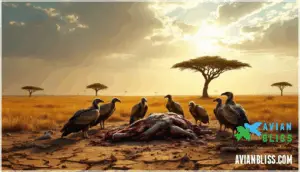
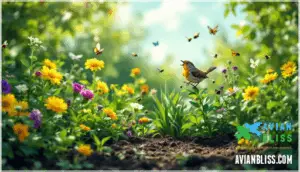
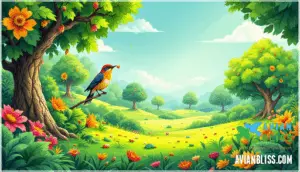

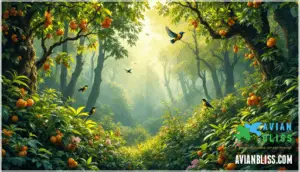
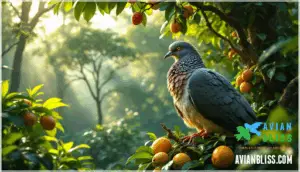
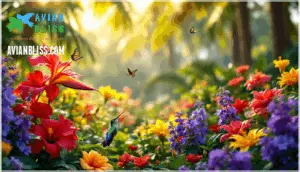
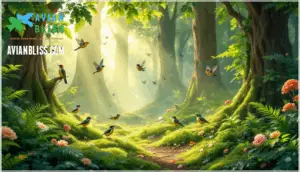

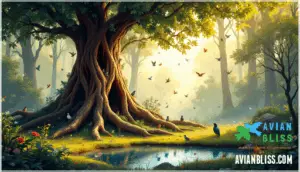
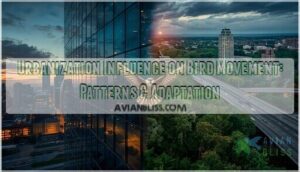
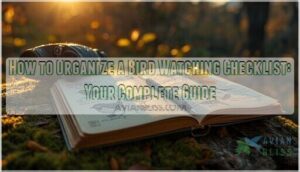
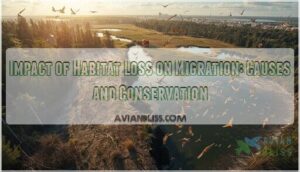
Luckson
February 6, 2025 at 04:01 PM
Great story. I am a Journalist based in Livingstone, Zambia. I enjoy birding and bird stories. I am requesting to use your story at a training workshop BirdWatch Zambia aimed at encouraging Journalists to develop an interest in reporting on birds and wildlife in general.